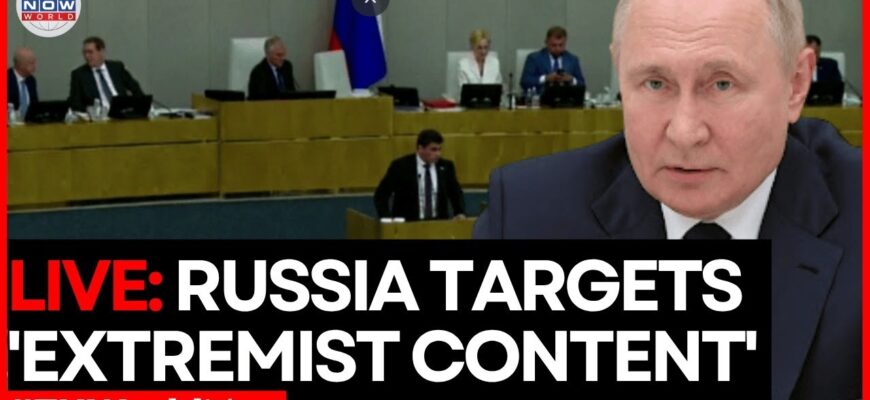In an era where digital content reigns supreme, a new legislative initiative in Russia aims to redefine the boundaries of online expression. Proposed amendments seek to grant the Ministry of Culture sweeping powers to mandate the blocking or removal of content deemed to “discredit traditional Russian spiritual and moral values.” This move, poised for a second reading, has ignited a fierce debate regarding censorship, artistic freedom, and the very definition of what constitutes “traditional values” in the digital age.
The Proposed Framework
The core of the new amendments, targeting the laws “On Information” and “On State Support of Cinematography,” is straightforward yet far-reaching. Online content platforms, including major streaming services, websites with over 100,000 daily users, and social networks exceeding half a million daily users, would be obligated to comply. The mandate extends to removing or blocking any material that the Ministry of Culture decides “discredits traditional Russian spiritual and moral values.” Furthermore, content that has been denied a distribution certificate by the ministry would also fall under this new regulation.
Significantly, this legislative reach is not limited to professionally produced films or series. It also includes “personal pages” on social media platforms, extending the scope of potential content moderation to the posts of ordinary users.
The Unspoken Definition: A Legal Minefield
Perhaps the most contentious aspect of the proposed legislation is its reliance on a concept that remains stubbornly undefined: “traditional spiritual and moral values.” This critical omission leaves the interpretation wide open, a scenario that legal experts warn could lead to arbitrary enforcement and a chilling effect on online discourse. Fyodor Kravchenko, managing partner of the Collegium of Media Lawyers, succinctly highlighted this ambiguity: “To this day, not only in laws but even in various subordinate acts, in judicial practice, the concept of `value,` `moral and spiritual value,` which is used in this bill, is not defined and can be interpreted extremely broadly.” He added, with a hint of professional exasperation, that the concept of “traditional” itself is equally vague, requiring “infinite clarification.” This lack of precision, he argues, directly infringes upon the fundamental human right to receive and disseminate information.
The Industry`s Existential Crisis
For online cinemas and streaming platforms, the implications of these amendments are nothing short of catastrophic. Earlier iterations of similar proposals led major players like “Kinopoisk” to estimate that up to 90% of their existing content libraries might have to be deleted. The sheer logistical nightmare of having state officials review years` worth of content for new distribution certificates, or for compliance with an undefined value system, could take “years,” according to industry insiders. This presents a direct threat to business models, built on elaborate copyright agreements and revenue-sharing mechanisms. The chaotic blocking of content would not merely be an inconvenience; it would be a substantial financial blow.
Adding to the confusion, initial statements from State Duma officials suggested that the amendments would only apply to *newly uploaded* content. However, experts examining the revised texts have found no such clear distinction, implying that the obligation to remove content without a distribution certificate, or that which “discredits values,” could apply retrospectively, covering vast existing libraries.
The Cinematic Conundrum: A Retreat to Fairy Tales?
Beyond the legal and financial quagmire, the new rules cast a long shadow over artistic expression within Russia. Alexander Golubchikov, editor-in-chief of “Zoomfilm,” grimly notes that Russian cinema already “walks on a razor`s edge.” In his view, the safest bet for filmmakers might soon be to “shoot only fairy tales.” He cites examples of films tackling sensitive, yet socially relevant, themes like domestic violence, which already struggle to secure distribution certificates. The new legislative landscape could amplify this trend, pushing creators towards self-censorship to avoid potential repercussions. Indeed, content has already been removed or re-edited, as seen with “Clinic of Happiness,” where “motives of some key characters were re-voiced, re-edited, and some sedition disappeared from them.” This legislative pressure, it seems, mandates an artistic purification, ensuring that content aligns with an ever-evolving, yet unarticulated, state-approved moral compass.
Looking Ahead: A Defining Moment for Digital Freedom
The impending second reading of these amendments, expected on July 22nd, marks a critical juncture for Russia`s digital landscape. While framed as a measure to protect societal values, critics argue it represents a significant expansion of state control over information and artistic expression. The battle over “traditional values” in the digital realm is not just a Russian phenomenon, but its stark, undefined application in proposed legislation offers a potent case study in the complexities and perils of content regulation in the 21st century. The outcome of this legislative push will undoubtedly shape the future of online freedom and creativity within the nation.








